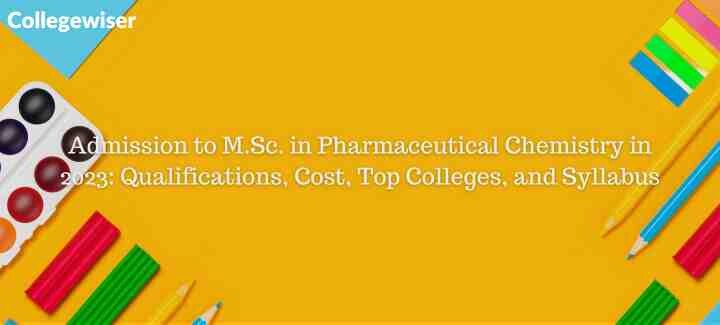Admission to the MSc in Pharmaceutical Chemistry 2023: A master’s degree in the scientific stream is called MSc Pharmaceutical Chemistry. The investigation of new medications and analysis are the main topics of this curriculum. To research the design, synthesis, and characterization of pharmaceuticals, it combines components of chemistry, biology, and pharmaceutical science. Students are instructed in the concepts and techniques used in drug design and synthesis, such as combinatorial chemistry and computer-aided drug design. Below is information regarding this MSc’s admissions.
Enquire Now!
A UG degree in a related field is the minimal requirement for entrance to the MSc Pharmaceutical Chemistry program. Graduates of the BSc Biotechnology, B.Pharm, and BSc Chemistry programs are eligible to apply. Some institutions can require a UG degree with a minimum of 50%.
Options for specialization and programs: By choosing a PC concentration for their MSc degree, students can seek careers that fit with their areas of competency. Popular specialties of this MSc program include computational drug design, pharmaceutical technology, medicinal chemistry, pharmaceutical analysis, and analytical chemistry.
Admissions procedures for the MSc in Pharmaceutical Chemistry are listed below.
Candidates must submit an application for the MSc in Pharmaceutical Chemistry. It provides the university with details on the applicant’s upbringing and schooling. Accurate form completion and a comprehensive assessment are required to meet the criteria.
Exams for the MSc in Pharmaceutical Chemistry: Some institutions may accept test results for admission to this degree. The BITSAT, MPH-CET, WBJEE, NIPER JEE, and GATE are popular tests.
Pre-admission interviews for the MSc in Pharmaceutical Chemistry examine applicants’ qualifications, motivation, and interpersonal abilities. They help the admissions committee assess a student’s chances of excelling in the course.
Selection on the basis of merit: MSc Pharmaceutical Chemistry Merit-based selection is focused with evaluating the merits of applicants, typically taking into account their UG degree grades.
Typical Fees: Fees for an MSc in Pharmaceutical Chemistry range from INR 20K to INR 2L.
An MSc Pharmaceutical Chemistry student makes an average annual salary of between INR 3 lakh and INR 5 lakh (LPA).
Admission to the M.Sc. in Pharmaceutical Chemistry Overview
| Course Name | MSc Pharmaceutical Chemistry |
| Course Level | Post-graduate |
| Course Mode | Regular/Distance |
| Full-Form of MSc PC | Masters of Science in Pharmaceutical Chemistry |
| Admission Process | Merit-based/ Based on the performance in the entrance test |
| Duration | 2 years |
| Average Salary Offered | INR 03 to 05 lakhs per annum(LPA) |
| Average Fees Incurred | INR 20K to 02 Lakhs |
| Eligibility | Completed BSc with minimum 50% marks from a recognized university |
Admission to M.Sc. in Pharmaceutical Chemistry 2023
The two-year M.Sc. Pharmaceutical Chemistry program is in the medical sciences. It is PG-rated and accessible. It is focused on the intersection of pharmacology, other biological specializations, and synthetic organic chemistry.
The grades attained in the entrance exam held by the appropriate universities in which applicants are interested in enrolling will determine admission to the MSc Pharmaceutical Chemistry program. The quality of the graduation program determines admission to this program. The MSc Pharmaceutical Chemistry course covers a variety of medical sciences in addition to biology, chemistry, and physics. The course has been specifically created for drug manufacture and research. These highly regarded institutions, such as CPU Kota and BV Tonko, etc., advertise admission.
Pharmacognosy, Organic Chemistry, Pharmaceutical Analysis, Biochemistry, General Pharmacology, Organic Synthesis, Drug Action, Pharma Technology, etc. are all included in the M.Sc. Pharmaceutical Industry Admission Syllabus.
Admission Requirements for the M.Sc. in Pharmaceutical Chemistry
Candidates for the M.Sc. in Pharmaceutical Chemistry program must have finished their undergraduate work in a related subject.
This master’s program accepts graduates with BSc in Chemistry, B.Pharm, BSc, BBA, BA, and other related degrees.
A minimum GPA of 50% is needed to fill out the M.Sc. Pharmaceutical Chemistry application form.
This M.Sc. program in Pharmaceutical Chemistry only accepts students once a year.
Exams for admission to the M.Sc. in Pharmaceutical Chemistry are CPUCET and BVCET.
Candidates seeking admission to the MSc in Pharmaceutical Chemistry must have a minimum of 50–60% in their BS in Chemistry.
Admission Criteria for the M.Sc. in Pharmaceutical Chemistry
The MSc Pharmaceutical Chemistry program’s tuition ranges from INR 20K to INR 2 Lakhs.
Salary for an MSc in Pharmaceutical Chemistry
Pharmaceutical professionals can expect to make an initial salary of between INR 3 and INR 5 lakhs per annum (LPA). Biotechnological firms, pharmacies, hospitals, healthcare facilities, and educational institutions are among the industries that hire M.Sc. PC graduates.
Job Types for MSc in Pharmaceutical Chemistry
- Professor
- Lecturer
- Scientist
- Patent Analytics
- Research Officer/Executive
- Assistant Manager
- Scientific Data Entry Specialist
- Pharmaceutical Patent Analyst
- Quality Control & Quality Assurance Analyst
- National Sales Manager (Pharmaceutical Chemistry)
kinds of courses
Full Time: The normal 04-semester Masters in Pharmaceutical Chemistry course is offered full time.
Part-Time/Online: The MSc Pharmaceutical programme is also offered online.
Admission Tests for MS in Pharmaceutical Chemistry
The most well-known admission tests are;
IBAB Entrance Test, the Joint Entrance Screening Test for PhD, the National Entrance Screening Test for Integrated M.Sc., and the GIPE B.Sc. Entrance Exam
Admission Syllabus for Pharmaceutical Chemistry in M.Sc.
| Year I | Year II |
| Advanced Organic Chemistry | Phytochemistry Lab |
| Pharmaceutical Chemistry I | Communicative English II (Common to MSc., M.C.A.) |
| Chemical & Instrumental Methods of Drug Analysis | Process Chemistry in Pharmaceutical Industry |
| Organic Synthesis Lab | Medicinal Chemistry |
| Medicinal Chemistry Lab | Analytical Techniques in Chemistry |
| Communicative English I (common to MSc., M.C.A.) | Computer Application/Basics (Common to Organic Chemistry) |
| Advanced Chromatographic Techniques | Computer Application/Basics Lab |
| Pharmaceutical Chemistry II | Chemical Methods of Drug Analysis Lab |
| Bio-Organic Chemistry (common to organic chemistry) | Pharmaceutical Quality Control and Quality Assurance |
| Phyto-chemistry (Common to Organic Chemistry) | Enzyme Technology |
| Pharmaceutical Chemistry Lab | Project Work |




